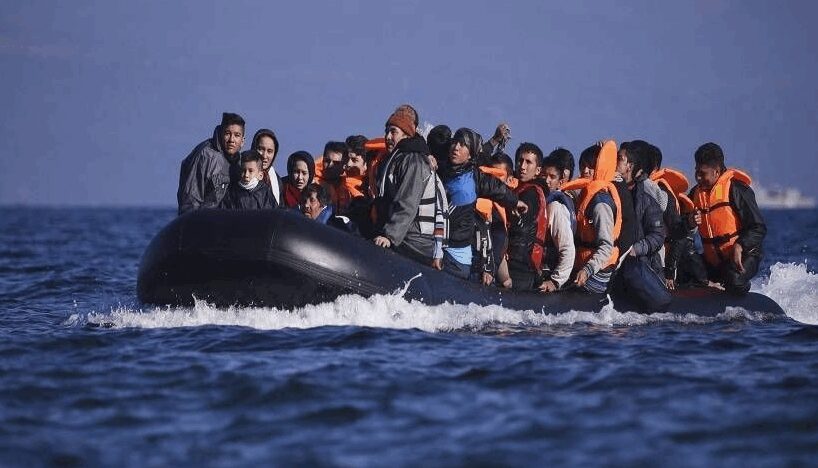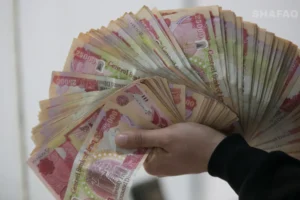
Shafaq News
The
detention of twenty-five young Kurdish men from Al-Sulaymaniyah by Libya’s Anti-Illegal
Migration Authority west of Tripoli has once again cast a spotlight on Iraq’s
deepening migration dilemma. The Iraqi embassy in Tripoli confirmed it had
launched urgent procedures to secure their voluntary return in coordination
with Libyan authorities, while the Kurdistan Region’s Department of Foreign Relations explained that
the main challenge in repatriation was the loss of passports, which smugglers
had taken to prevent their return.
Beyond the
consular maneuvering, the case reflects a structural crisis that is drawing
Iraq more tightly into the arc of irregular migration spanning Turkiye, Libya,
and the Mediterranean.
For Iraqis,
the decision to embark on such dangerous journeys is rarely impulsive. Years of
unemployment, political deadlock, and collapsing public services have convinced
many young people that they have no real future at home.
“Migration
has become almost the only option for many young people who lack jobs or
stability inside Iraq,” Aras Mohammed, 35, from Al-Sulaymaniyah, told Shafaq
News. His account mirrors a broader pattern identified by European and UN
agencies: organized smuggling networks stretch from Baghdad and the Kurdistan
Region through Turkiye and onward to Greece, Italy, and eventually to
destinations such as Germany and the Netherlands.
The costs,
he explained, can reach staggering levels—sometimes as high as $130,000—paid in
installments, with smugglers providing boats, temporary accommodation, and
forged documents. Yet many fall victim to fraud or are simply abandoned along
the route.
Adil Khalil,
25, from Kirkuk, described how his own attempt collapsed after paying $50,000
to cross through Turkiye into Greece. The smuggler left his group in the forest
without food or shelter. “We stayed for days waiting for help, but no one came.
Eventually, I surrendered to the Turkish authorities and returned to Iraq
empty-handed. My dreams turned into a nightmare,” he told Shafaq News.
The
testimonies echo hard statistical realities. Frontex, the EU’s border agency,
recorded just over 239,000 irregular border detections in 2024, down
thirty-eight percent from 2023, with the steepest fall on the Central
Mediterranean and Western Balkans routes. Yet the EU Asylum Agency still
processed nearly one million asylum claims in 2024, underlining that demand for
entry to Europe remained strong. Iraqis accounted for some 37,000 applications
between January 2023 and June 2024, with Germany, Greece, and the Netherlands
at the forefront. Recognition rates at the first instance averaged around forty
percent—enough to fuel further departures despite the risks.
Libya’s
central role in this corridor remains highly problematic. UNHCR figures show
sea arrivals to Italy fell dramatically in 2024—to just over 66,000 compared to
more than 157,000 the previous year. But the Libyan coastline remains active:
IOM documented more than 20,000 people intercepted or rescued at sea in 2024
alone, while its displacement tracking system recorded more than 867,000
migrants inside Libya by spring 2025.
Inside Iraq,
debate has turned to whether the networks facilitating this migration have
links to legitimate businesses. Some travel companies are accused of covering
for smuggling operations. Yet as Abu Abdullah al-Jumaili, a Baghdad-based
travel agency owner, insisted, “Our companies work legally, providing tourism
or medical trips. But some individuals exploit the tourism cover to facilitate
smuggling, damaging the reputation of the entire sector.”
The
consequences extend beyond those who leave, as thousands of Iraqis deported
from Europe face daunting reintegration challenges. “We thought we would find
stability there, but the laws suddenly changed. We came back empty-handed after
losing all our savings,” said 52-year-old Sana’a al-Jaberi, who was expelled
from Germany. She recalled the absence of any government support, leaving
returnees in conditions almost as dire as those that pushed them to migrate in
the first place.
For
Abbas al-Ali, a specialist in migration studies, migration
is not just an individual adventure; it reflects economic, social, and
political crises. Al-Ali stressed that unless Iraq addresses structural
drivers—job creation, investment, service delivery, and political
stability—youth will continue to see migration as the only horizon.
Based on analyses from the European Union Agency for Asylum (EUAA) and
other sources, journalists, minorities, and individuals accused of
transgressing social codes in Iraq are identified as consistently vulnerable
and seeking asylum abroad. These groups face “severe risks, including violence,
intimidation, and persecution by both state and non-state actors.”
In the
Kurdistan Region, migration rates have risen noticeably over the past two
years. Kamran Shawkat, a young man from Erbil, attributed this primarily to
economic hardship but also to growing political disillusionment. “The absence
of hope for a stable future pushes youth into taking risks, no matter the
dangers. Many see migration as salvation, even knowing the road is filled with
prisons—or death,” he said.
The Al-Sulaymaniyah detainees embody a larger reality: a generation that
sees no path forward inside Iraq. Unless Baghdad and Erbil can create
opportunities at home, Libya’s prisons and Europe’s deportation flights will
remain part of the Iraqi migration story.
Written and edited by Shafaq News staff.





